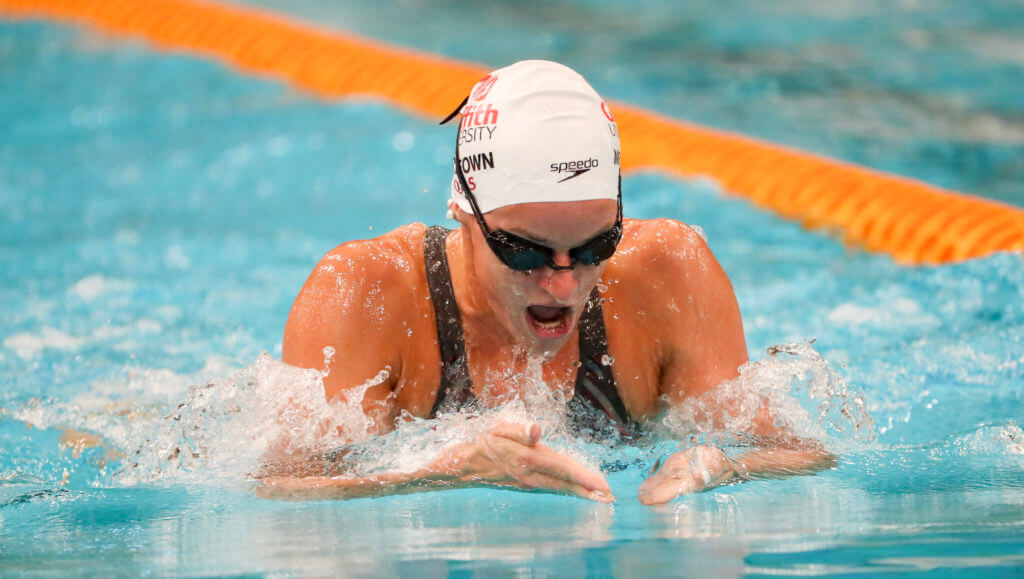The 200 IM Problem: Schedule Looms as Issue for Medal Favorites in Fukuoka

The 200 IM Problem: Schedule Conflicts Loom for Medal Favorites in Fukuoka
At major swimming competitions, the event schedule means everything. Michael Phelps could only win a record eight gold medals at the 2008 Olympics because the schedule lined up. He swam four single-session doubles, but only one of those doubles was back-to-back finals — and in that lone instance, the second swim was the 800 freestyle relay that the United States won by more than five seconds.
The event schedule also was critical in Phelps becoming the first man to threepeat at an Olympics. In the 200 IM at the London Games, Ryan Lochte entered as two-time world champion (on the way to winning four in a row) and world-record holder, but he raced the 200 backstroke final minutes before the 200 IM, and Phelps got the better of a fatigued Lochte by six tenths.
This year, the lineup events at the World Championships in Fukuoka, Japan, will force multi-event contenders to make some difficult decisions in hopes of maximizing their performances. The event creating potential dilemmas is the women’s 200 individual medley, which has emerged as one of the most competitive and star-studded events in the world just one year after Alex Walsh captured the world title by 1.44 seconds in Budapest.
Already this year, Summer McIntosh has become just the fourth woman ever under 2:07 with her 2:06.89 at Canadian Trials while Kaylee McKeown went 2:07.19 to nearly beat a 14-year-old Australian record held by Stephanie Rice. McKeown notched another 2:07 performance at Australian Trials this week. Three others have been 2:08s already, with impressive swims from China’s Yu Yiting and Canada’s Sydney Pickrem at their respective national qualifier meets while backstroke and butterfly star Regan Smith shocked the world earlier this month when she knocked off more than one-and-a-half seconds in a day to swim a time of 2:08.48 in the event.
The problem here is that McIntosh, McKeown and Smith all face potential event conflicts at next month’s Worlds, which will follow the same schedule as last year’s meet. McKeown is already familiar with such a logjam: she has held the world record in the 100 backstroke for two years, but she did not swim the event in Budapest, choosing instead to focus on the 200 IM. The reason is that the 100 back semifinals take place less than 25 minutes before the 200 IM final on the Worlds schedule. If McKeown had raced the 100 back, she would have entered the medley final compromised.
Now, with Smith making inroads in the 200 IM for the first time, she could potentially face that same double. It is unclear if Smith will opt to swim the 200 IM at U.S. Nationals later this month, and even if she does, qualification is no guarantee with the likes of Walsh, Worlds bronze medalist Leah Hayes and Olympic bronze medalist Kate Douglass in the field. The realities of the Worlds schedule will undoubtedly be part of the decision-making process for Nationals for Smith and her coach, Bob Bowman.
McIntosh, meanwhile, faces a conflict between the 400 free and 200 IM on day one, with the 200 IM semis beginning less than 20 minutes after the 400 free final. Normally, a final and then a semifinal is doable, but the 400 free relay final is also scheduled for later in the session, and Canada would surely prefer to use McIntosh on that squad, particularly after veteran Penny Oleksiak withdrew from the meet due to injury. The 16-year-old McIntosh could be the world-title favorite in up to five individual events, but she has yet to attempt more than three at a major competition. Based on the schedule, the 200 free seems like a more schedule-friendly addition than the 200 IM.
The good news for McKeown, Smith and McIntosh is that the new event lineup in place for the 2024 Olympics has the 200 IM toward the end of the program, with a day seven semifinal and day eight final, after all of these swimmers would be finished with their backstroke, butterfly and freestyle individual obligations. The nine-day program set to be implemented for the first time in Paris could allow swimmers to attempt more events than they would have at a previous Worlds or Olympics.
But for this year’s Worlds, there will be no changes. These are the best swimmers in the world, but fatigue is a reality for everyone involved, putting 200 IM specialists at a big advantage if they arriving fresh and rested for the final.




The 200 back and 200IM conflict in Paris for Kaylee still. 200IM semi is the same session as the 200 Back final.
I they just swam prelims and finals instead of making them swim 3 times for every event, then the best swimmer could win. And everyone could go fast.